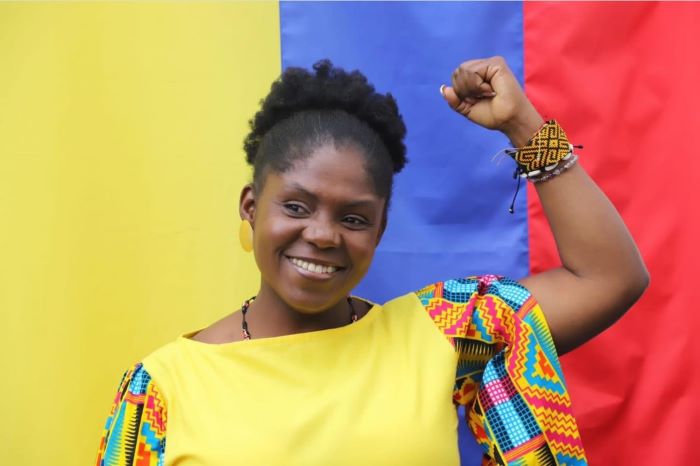The seventh of August was a doubly historic day for Colombia because the first left-wing government took office, with Gustavo Petro at its head, and in the vice-presidency, the first Afro-Colombian feminist, left-wing, activist, lawyer and environmental rights defender, Francia Márquez.
But who is Francia Márquez, why is this woman now at the centre of international politics, what is the political agenda of a racialised woman of humble origins who makes us think about the urgency of building a democracy that combines social justice, feminism and environmental rights, what does a woman like Francia Márquez represent for the sectors forgotten by the Colombian state and, in particular, for indigenous, Afro-descendant, Palenquero, raizal and peasant women?
Francia Márquez was born in Cauca, a place ravaged and controlled by racial hierarchies. Her life trajectory as an activist, academic and Afro-descendant woman represents the feelings of the marginalised and precarious sectors of Colombia and, at the same time, the joy and hope for a different future, condensed in her famous phrase ” to live deliciously”, which claims the right of every person to enjoy and enjoy life.
Francia represents a historical struggle: that of the Afro-descendant and indigenous peoples in Colombia who have been constantly outraged by an extractivist and patriarchal system and to whom war has been declared because their lives have never been invested with a future by the nation. Today, these subjects wounded by the arrogance of Colombia’s colonial and racial history appear under the figure of The Nobodies, lives that matter and bring with them the keys to a profound and necessary transformation based on the care of life and territories, and insist on rescuing from the living memory of the people the links between ancestry and the future.
The Nobodies is a political manifesto and a recognition of those who have been dispossessed, violated and erased by a paramilitary, classist and racist state. The Nobodies give a name to those who do not have and have never had an existence in the political imaginary of Colombia. The Nobodies poetically embodies a powerful resistance that shakes the foundations of conservative and traditional politics and, at the same time, makes it possible to reimagine a way of doing politics in favour of life.
France draws inspiration from the struggles of the Afro people and the philosophy of ubuntism, where different forms of existence are interrelated in solidarity, reciprocity and interdependence, and proposes a way to rethink our societies and move towards a full life, free of violence and discrimination. Her political proposal challenges the foundations of a racist, extractivist and patriarchal model that has had harmful consequences for Colombian society and proposes to work together to transform Colombia into a world power of life. Their courageous and committed work builds an underground network that links millions of nobodies in different Latin American countries who are gradually waking up and recognising each other, as happened a few years ago in Chile on that Friday in October when the nobodies looked at each other’s faces, astonished and hopeful for a possible future.












